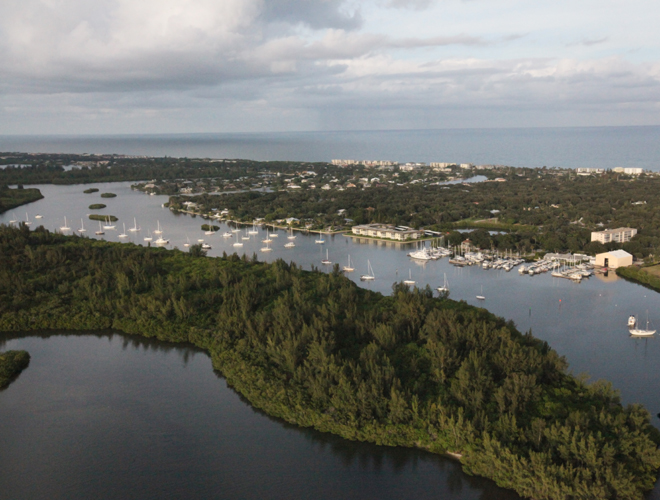
Vero Beach 32963 recently received an email from an island resident worried about the possibility of boats dumping human waste in or near the municipal marina north of the Barber Bridge, contributing to the nitrogen problem in the lagoon.
With more than 200 boats moored at the marina during the busiest part of the season, it is a natural enough concern and Harbormaster Tim Grabenbauer says he has fielded similar inquiries.
“I had a phone call from someone who was concerned about the boats anchored up north of our mooring field. I told them it is perfectly legal for the boats to moor in those waters. I usually visit them and ask them to enjoy their stay in Vero Beach. I haven’t seen any sign of illegal waste dumping by those boats or the ones in the marina.”
Florida Fish and Wildlife Officer Lenny Salberg backs up Grabenbauer’s perception.
“We don’t have any record of dumping violations in that area,” he says. “Problems usually occur at small, run-down marinas. We don’t see many violations at large, well-kept marinas with pump-out stations.”
Most boats large enough for overnight trips have a toilet, or head, with a storage tank for waste. When boats are at sea, in the open ocean, it is legal for waste to be flushed directly into the water. When they are in inland waters like the lagoon, however, waste has to be contained in an onboard tank and pumped out at a pumping station.
A wye valve determines which way waste flows and Salberg says Florida Fish and Wildlife officers make surprise inspections of live-aboard boats in area marinas to make sure the valve is in the correct position and has some type of locking device in place.
“If we can’t get at the wye valve, we put a dye pack in and flush and see if the water near the boat is stained orange.”
Violators are given a ticket requiring them to appear in court and pay a fine if convicted.
“We film our investigations so that we have evidence of the violation,” Salberg says.
The Vero Beach Marina, which Grabenbauer says was founded sometime in the 1930s, has a pump-out station at the fuel and water dock that empties into the city sewer system. Boats use the system to empty their waste tanks when they stop for gas or water. Grabenbauer also operates a pump-out boat that services boats moored at buoys in the river.
“We pump out twice a week and do as many as 20 boats a day during the season,” he says. “We submit reports to DEP about how many boats we pump out, the volume of waste and how many of the boats are from out of state.”
Because of its pump-out facilities and adherence to a wide range of other best practices having to do with fueling, painting, maintenance and toxic material disposal, Vero’s marina was the first in the area to certified by the state as a Clean Marina, more than 10 years ago.
Grabenbauer, a retired Coast Guard quartermaster who has worked at the marina since 1997 and been harbormaster since 2004, says he has assisted DEP in helping other area marinas gain the same certification.
Originally from Iowa, he went to junior high and high school in Vero before joining the coast guard, serving aboard two Florida vessels during his early career, including the Miami-based cutter Hudson, which still plies Vero’s waters, repairing channel makers.
Stationed in Cape Cod when he retired, Grabenbauer says he came back to Vero because he “wanted to be warm again.”
He keeps a close eye on everything that happens at the marina and it is hard to believe anyone would get away with illegal dumping on his watch.
“You would smell it for one thing,” he says.
Anyone who sees illegal dumping should report it the Florida Fish and Wildlife, taking care to identify the boat if possible.
“We will come out and investigate,” Salberg says.



